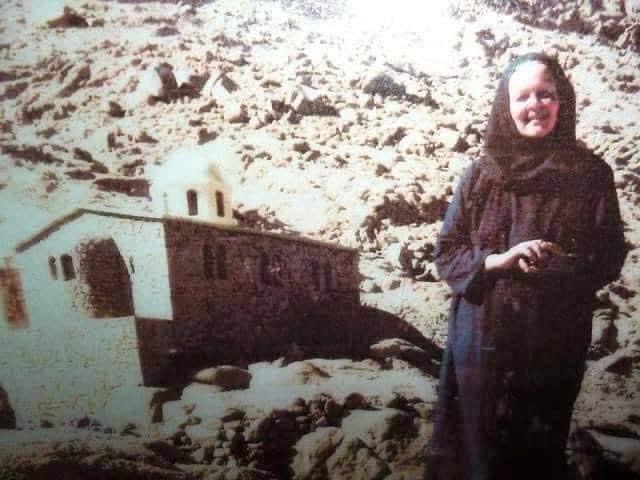
Focus on the Faith
THE FEAST OF THE PROTECTION OF THE MOTHER OF GOD
The feast day celebrates the appearance of the Mother of God in Constantinople at Blachernae (Vlaherna) in the tenth century. At the end of St. Andrew of Constantinople) Yurodivyi's life, he, with his disciple St. Epiphanius, and a group of people, saw the Mother of God, St. John the Baptist, and several other saints and angels during a vigil in the Church of Blachernae, nearby the city gates. The Blachernae Palace church was where several of her relics were kept. The relics were her robe, veil, and part of her belt that had been transferred from Palestine during the fifth century.
The Theotokos approached the center of the church, knelt down and remained in prayer for a long time. Her face was drowned in tears. Then she took her veil off and spread it over the people as a sign of protection. During the time, the people in the city were threatened by a barbarian invasion. After the appearance of the Mother of God, the danger was averted and the city was spared from bloodshed and suffering.
The icon of the feast, shows the Theotokos standing above the faithful with her arms outstretched in prayer and draped with a veil. On both sides of her are angels. On the lower right of most icons of this feast, are saints Andrew and his disciple Epiphanius who saw this vision of the Mother of God, with the twelve apostles, bishops, holy women, monks and martyrs, spreading her veil in protection over the congregation. St. Epiphanius is wearing a tunic under his cloak and gestures in astonishment at the miraculous appearance, while St. Andrew, Fool-for-Christ, is dressed only in a cloak.
Below the Theotokos, in the center of the icon, stands a young man with a halo, he is clothed in a deacon's sticharion. In his left hand, he is holding an open scroll with the text of the Kontakion for Nativity in honor of the Mother of God. This is St. Romanus the Melodist, the famous hymnographer whose feast is also celebrated on the same day, October 1. He is with his choir attended by the Emperor Leo the Wise together with the Empress and the Patriarch of Constantinople.
From the Holy Fathers and Mothers
"How mistaken are those people who seek happiness outside of themselves, in foreign lands and journeys, in riches and glory, in great possessions and pleasures, in diversions and vain things, which have a bitter end! In the same thing to construct the tower of happiness outside of ourselves as it is to build a house in a place that is consistently shaken by earthquakes. Happiness is found within ourselves, and blessed is the man who has understood this. Happiness is a pure heart, for such a heart becomes the throne of God. Thus says Christ of those who have pure hearts: "I will visit them, and will walk in them, and I will be a God to them, and they will be my people." (II Cor. 6:16) What can be lacking to them? Nothing, nothing at all! For they have the greatest good in their hearts: God Himself!
(St. Nektarios of Aegina, Path to Happiness, 1)
"The Lord loves all people, but He loves those who seek Him even more. To his chosen ones the Lord gives such great grace that for love they forsake the whole earth, the whole world, and their souls burn with desire that all people might be saved and see the glory of the Lord.”
(St. Silouan the Athonite, Writings, IX.8)
"As it is impossible to verbally describe the sweetness of honey to one who has never tasted honey, so the goodness of God cannot be clearly communicated by way of teaching if we ourselves are not able to penetrate into the goodness of the Lord by our own experience."
(St. Basil the Great, Conversations on the Psalms, 29)
"Having God, fear nothing, but cast all of your care upon Him, and He will take care of you. Believe undoubtingly, and God will help you in accordance with His mercy.”
(St. Barsanuphius the Great, Instructions, 166)
Orthopraxis
A Prayer Rule
A prayer rule is a set of prayers taken from the Prayer Book that is said every single day without fail. One should always discuss one’s Prayer Rule with their spiritual father/father confessor before deciding on their own what it should be. Most of the time, the Rule is said in the morning and the evening, with shorter prayers, such as the Jesus Prayer, used throughout the day. In addition, prayers before and after meals should be incorporated into one’s daily routine. The goal of the Prayer Rule is union with God. When using a rule of prayer we must be flexible and do what works for us; our goal is to maintain the connection with God and cultivate a real relationship, not just fulfill our ‘rule’ of prayer.
Though we should pray unceasingly, our prayer rule must not and cannot be said, for example, when the TV is blaring or the kids are running about and screaming, but rather alone, in front of the icons, Gospel, and Cross in the quiet. Preferably we should say our rule with a lit oil lamp or candle and, if possible, the room lights should be dimmed. It is important to remember that we will never have time for God but rather we must make time for God, for the “Kingdom of heaven suffers violence, and the violent take it by force” (Matt. 11:12).
Upcoming Events
Upcoming events this month are in the online calendar, which you can subscribe to on your phone or tablet. Use the print button on the calendar to print a copy.
Click below to print a copy of this newsletter:


